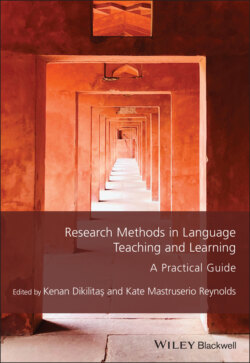Читать книгу Research Methods in Language Teaching and Learning - Группа авторов - Страница 56
The Findings of the Study and How These Findings Have Been Shared
ОглавлениеThis study revealed some innovative findings by shedding light on an unexplored area – the outcomes of implementing student negotiation in EFL speaking classes. This gap in the literature allowed me to follow grounded theory to generate hypotheses based on the data. Despite the lack of evidence on student-negotiated speaking classes, the existing literature provides ample insight into the factors influencing the effectiveness of these classes. It is agreed that student engagement is very important and students’ attitudes and perceived speaking abilities are among factors that determine whether students will be engaged in an activity or not. We referred to these assumptions in generating our hypotheses. One of the hypotheses was that student negotiation increases student engagement in speaking activities. The findings showed that negotiating the course content with students led to the development of more positive attitudes towards speaking, perceived speaking ability, and greater willingness to communicate. Considering these, it is clear that the hypotheses were generated based on the data, but we addressed the existing literature in identifying important findings that contribute to our knowledge.
To increase the possible contribution of this study to the ELT field, my doctoral supervisors and I hoped to publish articles in well-known journals, so that the results of our research would be available to many readers. However, it was difficult to report all stages of the study in one article. Therefore, we decided to write two articles – one focusing on Stage 2 and the other focusing on Stages 1 and 3. While the former addressed the findings of the research interventions, the latter presented the findings of the data collected before and after these interventions. In the first article (see Uztosun et al., 2014), we described the processes of eight weekly-based interventions, in which student negotiation was implemented, and reported structural (e.g., teacher’s roles, the level of control) and affective factors (e.g., being interesting, competitive, and feeling comfortable) that are likely to influence the effectiveness of EFL speaking classes.
The second article (see Uztosun et al., 2017) reported how student negotiation promoted student engagement, perceived speaking ability and willingness to communicate. After revisions which focused on the theoretical framework of the study and difficulties of showing the effectiveness of student negotiation in improving student negotiation, the article was published on 20 January 2017.
My preoccupation with providing empirical evidence on teaching and learning EFL speaking continued after my doctoral studies. I published an article describing the characteristics of pre-service teachers of EFL across Turkey in terms of language learning background (see Uztosun, 2017a), in which I commented on how many future teachers of English entered universities with limited language learning experience as this focused solely on grammar, vocabulary, and reading. The participants reported feeling least proficient in listening, speaking, and vocabulary. These findings provided support for the assumption that teaching speaking and listening is a major issue in EFL teacher education. This study encouraged me to investigate in-service EFL teachers’ views on the quality of ELT in Turkey, since I wanted to uncover problems that hinder the effectiveness of the ELT provided in state schools. The analysis of the data collected from a large group of participants (N = 2,476) showed that shifting the focus of ELT in Turkey to teaching listening and speaking could help to deal with some of the instructional problems that teachers reported encountering in teaching EFL (see Uztosun, 2018). In reviewing the literature related to teaching and learning EFL, I have found the term “student negotiation” to be of great interest as it seems to be highly relevant to improving EFL speaking skills. As a result, I developed a scale which I called the “self-regulated motivation for improving speaking English as a foreign language” (SRMIS-EFL) to measure the self-regulated speaking motivations of EFL learners (see Uztosun, 2017b). This is the only scale that measures self-regulated speaking motivation. Recently, I have conducted studies to test whether self-regulated speaking motivation is related to the development of EFL speaking skills. Considering the studies that I have conducted so far, it is clear that my doctoral research study increased my interest in teaching and learning speaking EFL.
